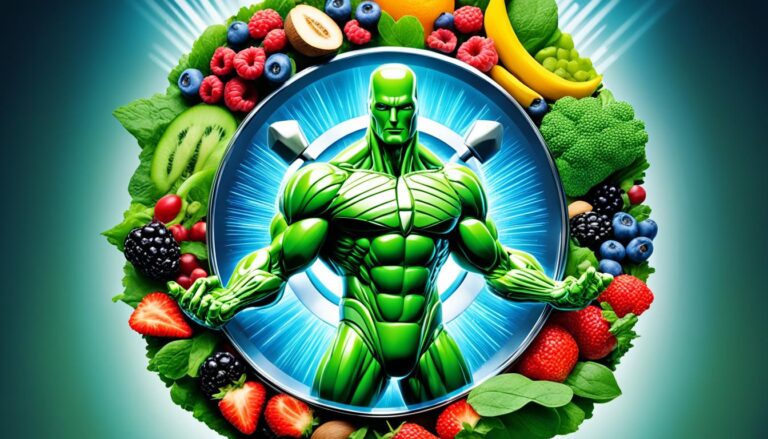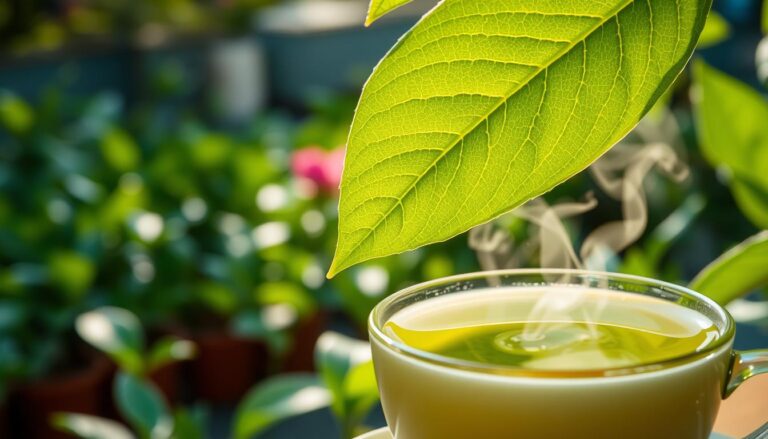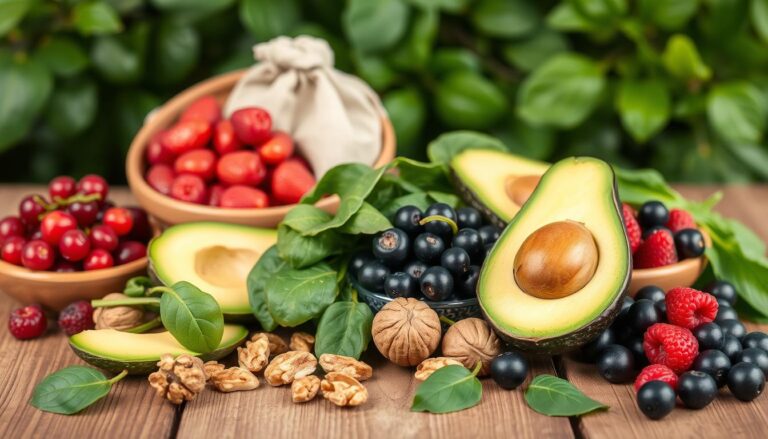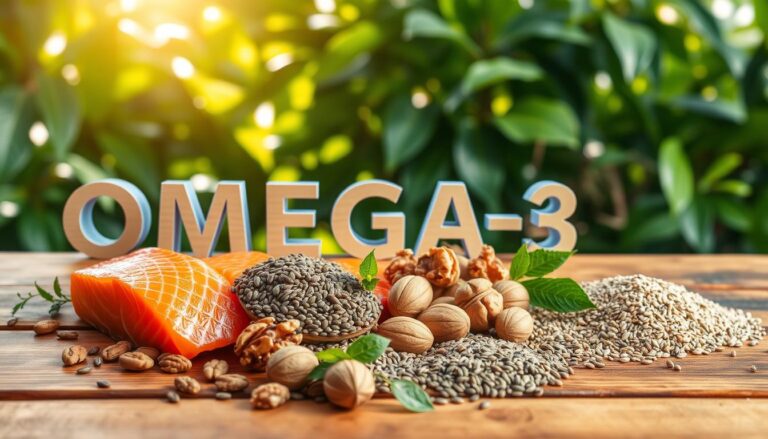Are you tired of the same old snacks? Pumpkin seeds are a great alternative. They are packed with nutrients and protein. These seeds, also known as pepitas offer many health benefits.
Key Takeaways
- Pumpkin seeds are a rich source of plant-based protein, providing 7.3 grams per 30g serving.
- They are filled with healthy unsaturated fats, fiber, vitamins, and minerals like magnesium, zinc, and iron.
- Pumpkin seeds have been associated with reduced risk of certain cancers, improved heart health, and better sleep.
- Incorporating pumpkin seeds into your diet is easy they can be roasted, added to salads, or enjoyed as a standalone snack.
- Pumpkin seeds are generally safe for most people, making them a versatile and nutritious option.
Introduction to Pumpkin Seeds
What are Pumpkin Seeds?
Pumpkin seeds, also known as pepitas, come from pumpkins and other gourd squash. Pepitas are seeds from certain pumpkins without hulls. Pumpkin seeds might still have their cream-colored shells.
Nutritional Overview of Pumpkin Seeds
Pumpkin seeds are a healthy snack full of good fats, minerals, and protein. A 1-ounce serving of whole roasted pumpkin seed kernels has 126 calories. It also has 5.5 grams of fat, 5.3 grams of protein, and 15.3 grams of carbs, with 5.2 grams of fiber.
They are packed with minerals like phosphorous, potassium, magnesium, and calcium. They also have iron, zinc, sodium, manganese, and copper. Plus, they have antioxidants like polyphenols and carotenoids, which are good for health.
Pumpkin seeds are a rich source of protein, containing about 5.3 grams per 1 ounce serving of whole roasted pumpkin seed kernels.
Pumpkin seeds are also full of essential fatty acids. These include omega-6 and omega-3 fats. The American Heart Association suggests these fats over saturated and trans fats.
Are pumpkin seeds rich in protein?
Pumpkin seeds are a great source of protein. A 1-ounce serving has about 5.3 grams of protein. This makes them a top choice for plant-based protein.
The protein in pumpkin seeds is of high quality. It has all the essential amino acids your body needs.
Compared to other high-protein foods, pumpkin seeds are unique. For example, pea protein powder has 27 grams of protein per serving. But pumpkin seeds have a better amino acid balance, especially lysine.
Pumpkin seed protein is also very bioavailable. This means your body can easily use the amino acids. Even though pumpkin seeds lack methionine, they can be paired with other foods for a complete amino acid intake.
Pumpkin seeds are not just high in protein. They are also packed with minerals like magnesium, phosphorus, copper, and zinc. A 1-ounce serving gives you 20% of the daily zinc value. Zinc is important for your immune system, fertility, and testosterone.
Pumpkin seeds are a protein-rich, nutrient-dense plant-based snack that can be a valuable addition to a balanced diet.
For vegetarians, vegans, or anyone looking for healthy snacks, pumpkin seeds are a great choice. They are easy to add to your diet and can help increase your protein intake from plant-based sources.
Health Benefits of Pumpkin Seeds
Pumpkin seeds are more than just a simple snack. They are packed with nutrients that offer many health benefits. These tiny seeds are full of antioxidants, vitamins, and minerals. They can help protect against many health issues.
Anti-inflammatory Properties
Pumpkin seeds have anti-inflammatory properties. They can help prevent chronic diseases like type 2 diabetes and heart disease. The antioxidants in pumpkin seeds fight off free radicals, reducing body inflammation.
Anti-cancer Properties
Research shows pumpkin seeds may fight cancer. Studies found that pumpkin seed compounds can slow down breast and prostate cancer cell growth. They might even kill cancer cells. But, more studies are needed to confirm these effects in humans.
| Nutrient | Amount per Ounce 28g | Percent of Daily Value |
|---|---|---|
| Calories | 80 | – |
| Protein | 18g | – |
| Fiber | 4g | – |
| Calcium | 33mg | 2% |
| Iron | 6mg | 35% |
| Potassium | 462mg | 10% |
| Zinc | 7mg | 45% |
| Magnesium | 319mg | 80% |
Pumpkin seeds are a great source of protein, fiber, and many vitamins and minerals. Adding them to your diet can help in many ways. They can reduce inflammation and might even prevent some cancers.
Pumpkin seeds are a nutritional powerhouse, packed with antioxidants and anti-inflammatory compounds that can promote overall health and wellness.
Pumpkin Seeds for Prostate Health
Many studies show pumpkin seeds can help with prostate health. They are full of nutrients that may ease BPH symptoms. BPH is when the prostate gland gets too big.
A 2011 study found zinc levels were lower in bad prostate tissue. One cup of pumpkin seeds gives almost half the daily zinc needed for prostate health.
A 2014 study showed pumpkin seed oil made hair grow 40 percent more in men with balding. Pumpkin seeds also have lots of magnesium, which is good for energy and blood pressure.
A 2015 study found pumpkin seed oil improved cholesterol and had anti-inflammatory effects. A small 2014 study showed it also helped with overactive bladder symptoms.
Pumpkin seeds have phytosterols that might stop prostate enlargement. Pumpkin seed oil could help reduce BPH symptoms by stopping prostate cell overstimulation and balancing hormones.
Experts say eating a handful of pumpkin seeds 2-3 times a week is good for the prostate. Adding these seeds to your diet is a simple way to help your prostate health.

Pumpkin Seeds for Overactive Bladder
For those dealing with overactive bladder OAB pumpkin seeds might offer a natural fix. Studies suggest that pumpkin seed oil and extract can ease the sudden need to urinate. This is a key symptom of OAB.
One study involved 45 people with OAB. They took 10 grams of pumpkin seed oil daily for 12 weeks. Their symptoms greatly improved. Another study found that pumpkin seed oil, sumac bark, and hops extract helped. It reduced daytime and nighttime urination and improved life quality.
Pumpkin seeds contain antioxidants and other good stuff. These might help lessen OAB symptoms. In the U.S., about 23% of people have OAB. Women are more likely to have it than men. Pumpkin seeds could be a natural, effective solution.
| Pumpkin Seed Benefits for Overactive Bladder | Research Findings |
|---|---|
| Reduced OAB Symptoms | A 2014 study found that people with OAB who took pumpkin seed extract for 12 weeks reported significantly reduced symptoms. |
| Decreased Urination Frequency | A study showed that a combination of pumpkin seed oil, sumac bark, and hops extract decreased the number of times people had to urinate during the day and night. |
| Improved Quality of Life | The same study that found decreased urination frequency also reported improvements in the participants’ quality of life. |
While more research is needed, the current evidence is promising. Adding pumpkin seed oil and pumpkin seeds to your diet might help manage overactive bladder. It could also support urinary tract health.
Cardiovascular Benefits of Pumpkin Seeds
Pumpkin seeds are great for your heart. They are full of magnesium, which helps control blood pressure. Studies show that magnesium in pumpkin seeds can lower blood pressure and reduce heart disease risks.
Pumpkin seeds also have antioxidants. These compounds boost nitric oxide in the body. This makes blood vessels healthy and improves blood flow.
These seeds are also good for your heart because they have fiber. A one-ounce serving has 1.8 grams of fiber. This helps keep cholesterol levels in check.
Eating pumpkin seeds is a tasty way to support your heart. You can roast them as a snack or add them to meals. They are a nutritious addition to any diet.
Pumpkin seeds are a powerhouse of heart-healthy nutrients, from their high magnesium content to their antioxidant properties. Adding them to your diet is an easy way to support cardiovascular health.
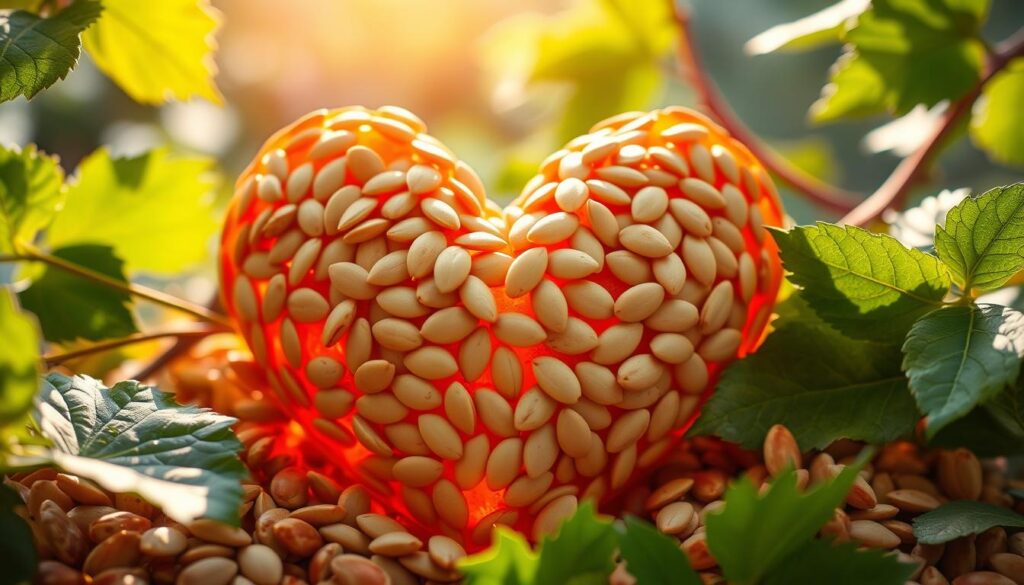
Pumpkin Seeds for Better Sleep
Snacking on pumpkin seeds before bed might help you sleep better. These seeds are full of tryptophan, an amino acid that helps you sleep. Tryptophan turns into serotonin, which controls when we sleep and wake.
Pumpkin seeds also have magnesium, which can lower stress and anxiety. These are big reasons why people can’t sleep. Plus, they have zinc, copper, and selenium, which help you sleep longer and better.
Tryptophan and Other Sleep Promoting Nutrients
Studies say eating 1 gram of tryptophan a day can make your sleep better. One ounce of pumpkin seeds has 1.1 grams of tryptophan. This makes them a great choice for your bedtime snack.
Pumpkin seeds are also packed with other nutrients for sleep. They have lots of magnesium, which is good for people with type 2 diabetes. They often have trouble sleeping.
Adding pumpkin seeds to your diet is easy and natural. You can eat them as a snack, on salads, or in smoothies. They make you feel refreshed and ready for the day.
Pumpkin Seeds and Fertility
Pumpkin seeds are known for their nutritional value. Recent studies show they might help with fertility, especially for men. They are rich in zinc, a key mineral for male reproductive health.
A study on mice showed pumpkin seed extract helped restore sperm production. The mice had lost sperm-making ability due to chemotherapy. Researchers think the antioxidants in pumpkin seeds protected against chemotherapy damage. While more research is needed, the results are promising, especially for cancer patients.
Pumpkin seeds also contain phytoestrogens, which may help with menopause symptoms in women. This makes them beneficial for both men and women’s reproductive health.
Adding pumpkin seeds to your diet is simple and beneficial. One ounce 28g has 5.3g of protein, 5.2g of fiber, and 20% of the daily zinc value. You can roast them, mix them into trail mix, or sprinkle them on yogurt. They’re a nutritious way to support your reproductive health.

Incorporating Pumpkin Seeds into Your Diet
Pumpkin seeds are a great addition to your meals and snacks. They are tasty and packed with nutrients. You can roast them at home or buy them pre-roasted.
Roasting and Preparing Pumpkin Seeds
Roasting pumpkin seeds yourself is the best way to get them. They are less salty and more mineral-rich than store-bought ones. To roast, rinse the seeds, toss with olive oil, and bake at 300°F for 30-40 minutes.
Creative Ways to Enjoy Pumpkin Seeds
- Add them to smoothies for a nutritious boost
- Mix them into homemade granola or sprinkle them on top of yogurt
- Use them as a crunchy topping for salads, soups, and stews
- Blend them into dips, spreads, and nut butter for a unique texture
- Bake them into cookies, breads, and other baked goods
Pumpkin seeds are a great choice for a protein-rich snack. They add flavor and health benefits to your diet.
Choosing and Storing Pumpkin Seeds
Choosing the right pumpkin seeds is the first step. Look for raw, unsalted ones with their hulls. These are packed with more fiber and minerals than hulled pepitas. You can find them at grocery stores, health food stores, and online.
Proper storage keeps pumpkin seeds fresh and nutritious. Store them in an airtight container in a cool, dry place. The fridge or freezer can also keep them fresh for months.
Pumpkin Seed Nutrition Comparison
| Nutrient | Pumpkin Seeds 1 oz | Almonds 1 oz | Walnuts 1 oz |
|---|---|---|---|
| Protein g | 7 | 6 | 4 |
| Fiber g | 5 | 4 | 2 |
| Magnesium mg | 156 | 80 | 45 |
| Zinc mg | 2 | 1 | 1 |
Pumpkin seeds are a nutrient-rich choice. They offer a lot of protein, fiber magnesium, and zinc. Knowing where to buy and how to store them ensures you get the most from this healthy snack.
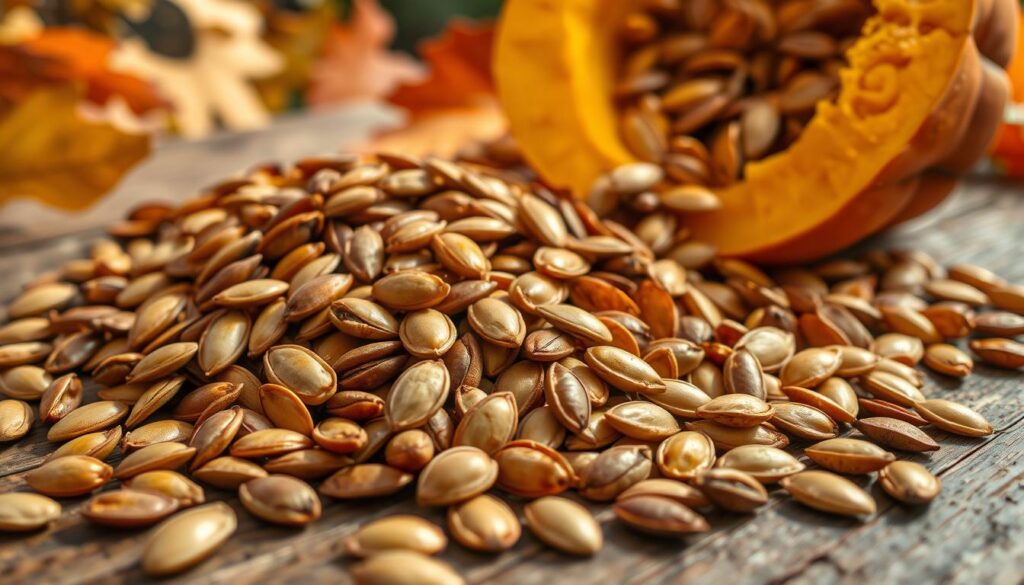
Conclusion
Pumpkin seeds are a nutritious snack with many health benefits. They are rich in plant based protein, healthy fats, fiber, vitamins, and minerals. These seeds also contain antioxidants that may help fight inflammation and lower cancer risk.
They support prostate and bladder health, heart function, and improve sleep. Adding pumpkin seeds to your diet is easy. You can roast them at home or enjoy them as a snack.
With their pumpkin seed nutritional profile, there are many reasons to eat pumpkin seeds. The pumpkin seeds health benefits summary is impressive. Pumpkin seeds are a superfood that can boost your health.
They are packed with protein and have potential health benefits. By adding them to your diet, you support your well-being. Enjoy the delicious, crunchy goodness of pumpkin seeds.
